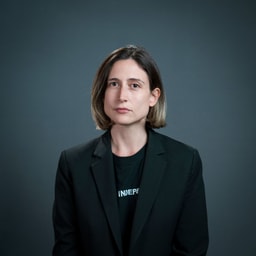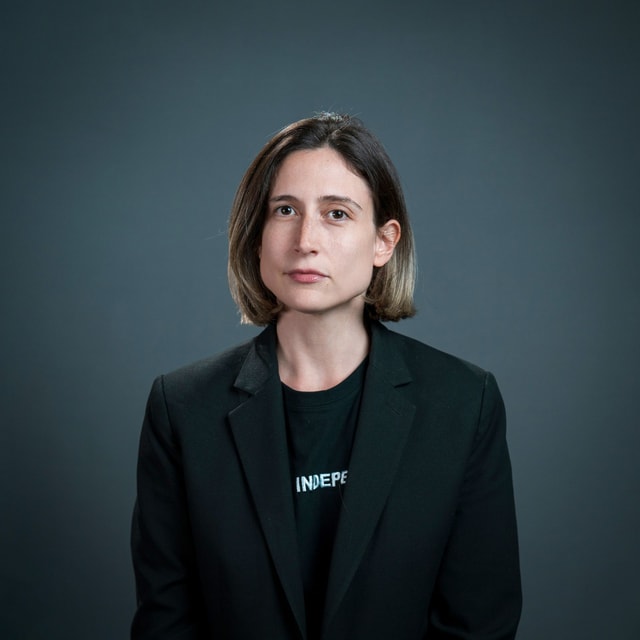Ukraine Business Roundup — Issue 5

The following is the fifth edition of our new Ukraine Business Roundup weekly newsletter. To get the biggest news in business and tech from Ukraine directly in your inbox, subscribe here.
The Kyiv International Economic Forum, one of Eastern Europe’s largest international forums, is taking place in Kyiv on Oct. 12.
The forum brings together representatives of business, government, and society to discuss key economic issues and global trends.
The Kyiv Independent will cover the event as a media partner.
Meet and greet
Last week, I had the chance to spend some time with the Ukraine Business Alliance — a group of American executives brought together by the D.C.-based McCain Institute — that was in town to meet with Ukraine's political leaders and civil society actors.
Along with the institute’s director, the alliance included executives from Microsoft, Palantir, drone maker Skydio, airspace defense and security firm Fortem Technologies, as well as a former congressman.
What these companies have in common is that they have all in some way or another been providing services to the Ukrainian government, free of charge, to help the country as it fights off Russian aggression.
Skydio, for example, has donated its drones to Ukraine’s Prosecutor General’s Office so that it can document destroyed civilian infrastructure and collect evidence of Russia’s human rights abuses.
During our first meeting at one of central Kyiv’s top hotels, what I really wanted to know from the group was why their companies felt compelled to help Ukraine in the first place. As one executive told me, it’s mostly about “wanting to do business in countries that are democratic,” since that’s where their business models thrive.
I wanted to know, too, if a battlefield isn't a fertile training ground for the types of technologies their companies develop, a question which was left unanswered. I can’t say for sure, but my feeling is that it’s hard to admit that tragic events, like the war in Ukraine or the Covid-19 pandemic, “black swan events,” as I wrote in my last newsletter, are also at times moments of profitable technological breakthroughs.
The group was also interested to know the overall mood in society in Ukraine. Inviting myself along with two representatives of Ukrainian civil society, they asked us to give our assessment of how people are feeling.
All three of us answered that we’re all tired, exponentially more than last year, but that no one we know is anywhere near ready to give up the fight. Amid a frightening fight over Ukraine funding in Congress, one can only hope the group will be bringing that exact message back to Washington, D.C. and to colleagues who may be interested in investing in Ukraine’s future.
Further reporting about the Ukraine Business Alliance's trip to Kyiv coming soon.
Black Sea update
A Russian missile attack on Oct. 7 damaged port facilities and grain silos in Chornomorsk, the site of one of Ukraine’s Black Sea ports. The strike also hit a residential area, injuring at least four people.
Overnight on Oct. 10, Russia also launched a total of 36 kamikaze drones in Ukraine’s south. The attack on Odesa Oblast lasted for three hours, with transport infrastructure hit, according to Governor Oleh Kiper. Fortunately, no casualties were reported.
The strikes are just the most recent in a series of Russian attacks on Ukraine’s port infrastructure along the Black Sea or the Danube River on Ukraine’s western border. The attacks may be a way of intimidating Kyiv as it has dared to create its own grain trade corridor in the Black Sea after Russia pulled out of the Black Sea Grain Initiative in July.
So far, Ukraine’s defiance might be working. Ukraine’s Navy said that 12 more cargo vessels were ready to enter Ukraine’s new Black Sea corridor on their way to Ukrainian ports and that another 10 were preparing to leave.
Despite Ukraine’s defiance, the move may be largely symbolic. Firstly, the ships are only loading at Ukraine’s western Black Sea ports, like Chornomorsk, and have to carefully maneuver the water by remaining close to the Bulgarian and Romanian coasts.
Secondly, 120,000 tons of grain is nothing compared to the tens of millions of tons of grain Ukraine was able to export through its Black Sea ports before the full-scale invasion or the 33 million tons that were exported out of those ports while the U.N.-backed Black Sea Grain Initiative was still alive.
And while some are hoping that Ukraine’s new grain corridor signals that Ukraine doesn’t need the Black Sea Grain Initiative anyway, UN officials are still trying to resuscitate the deal. Top UN trade official Rebeca Grynspan met with Russian officials in Moscow on Oct. 9 for talks aimed at creating "unimpeded access" to global markets for grain and fertilizer from Russia and Ukraine, Reuters reported.

Russian assets for Ukraine
In one of our most-read news stories of the week, Ukraine seized over $450 million worth of assets from three Russian oligarchs.
The assets belonged to Mikhail Fridman, Petr Aven, and Andrei Kosogov, all three of whom are believed to belong to Putin’s inner circle and be involved in financing the war against Ukraine.
In total, 20 companies that the oligarchs own, either directly or through offshore companies, have been seized, the Security Service of Ukraine (SBU) announced on Oct. 6. The companies seized include financial companies, communications and IT companies, insurance companies, and mineral water plants, the SBU said.
The seizure will prevent the businessmen from transferring the ownership of the companies to "fictitious persons in order to avoid the further transfer of assets to the income of Ukraine," the SBU said.
In similar news this past week, U.S. Secretary of State Antony Blinken said that the United States is looking at what legal authorities his country and its European partners have to use the roughly $300 billion in frozen Russian assets mostly tied up in Europe to pay for Ukraine’s reconstruction.
In Blinken’s view, “You broke it, you bought it.” But the Secretary of State added that “since most of the assets are in Europe, Europeans also have to be convinced that there’s a basis to do it.” The unanswered question: Will Europeans be convinced?

In the big league
Ukraine’s largest aircraft manufacturing company Antonov became the first Ukrainian company to join Europe’s largest aerospace lobby — the Aerospace, Security, and Defense Industries Association of Europe (ASD).
Membership in the lobby is aimed at strengthening ties between European and Ukrainian manufacturers. “I warmly welcome Antonov as a new ASD member, an important step towards the integration of the Ukrainian aerospace industry in the European industrial ecosystem,” ASD Secretary-General Jan Pie said.
Antonov’s ASD membership will also allow it to contribute to the International Coordinating Council of Aerospace Industries Associations (ICCAIA) in developing standards and regulations for aircraft security.
You may know Antonov as the maker of the iconic Antonov An-225 Mriya aircraft, the largest cargo plane in the world. Russian forces destroyed the only existing Mriya plane during the Battle of Kyiv last year.
The state-owned defense company conglomerate Ukrainian Defense Industry also said last month that Antonov will open a new drone center to enhance drone manufacturing capabilities in Ukraine.
And just recently, Antonov signed an agreement with a French company to produce the Aarok MALE (Medium Altitude Long Range) combat drone at Antonov’s facilities, La Tribune reported on Oct. 2.

Trading with purpose
In a story for the Kyiv Independent this week, reporter Dominic Culverwell wrote about one Danish businessman who set his sights on helping Ukraine through what he knows best.
When Russia’s war against Ukraine started last year, Danish entrepreneur Brian Karstens felt a strong desire to help Ukraine, but said his fighting years were behind him. So, as the Category Group Manager for Beverages for Coop Denmark, one of Denmark’s largest retailers, Karstens began importing and promoting Ukrainian products.
His idea was to help Ukrainian businesses struggling with the drop in domestic demand, with the idea in mind that when the war was over, they would have a foothold in European markets.
“When people are in need or in trouble, don't give them fish, give them a fishing rod,” Karstens told the Kyiv Independent.
Karstens left Coop in March, but his work promoting Ukrainian businesses in his home country didn’t stop there. Following his departure from the retailer, he started his own venture called Trade4Aid, a trade organization focused on “helping Ukrainian businesses market and sell their products to the West, despite the difficulties caused by war,” the organization’s website reads.
The organization is currently working with Shabo wine producers from Odesa, Lviv Handmade Chocolates, and the Mova Brewery in Dnipro. The products are distributed to third-party retailers with plans to expand the list of goods in the near future. These brands are some of the most recognizable in Ukraine.
Karstens says the beer and wine imports have been doing the best among Danes, and according to the businessman, since his fellow citizens aren’t super keen on trying new food, the organization is planning on expanding into Ukrainian houseware and kitchen goods.
With the positive reception so far, the businessman sees potential not just in Denmark but also internationally.
What else is happening
IMF revises Ukraine's economic growth outlook to 2% in 2023. The International Monetary Fund also expects gross domestic product to reach 3.2% in 2024. The increase in economic growth is due to “stronger-than-expected domestic demand growth, with firms and households adapting to the war in that country amid sharply declining inflation, and stable foreign exchange markets," the fund said in a report published on Oct. 10.
Ukraine Central Bank net foreign exchange sales totaled $1.15 billion in first week of more flexible currency policy. “Is this a lot? Definitely yes. But is it too much to pay for not fixing the exchange rate and avoiding the crisis consequences of a prolonged preservation of this regime? Absolutely not,” Ukrainian National Bank Governor Andriy Pyshnyi said on Facebook on Oct. 6. Ukraine’s central bank on Oct. 3 removed the official peg to the dollar after freezing the hryvnia at the start of the full-scale invasion.
Inflation in Ukraine falls to 7.1% in September. Consumer prices in Ukraine fell to 7.1% year-on-year by the end of September, down from 8.6% by the end of August, as inflation cooled in the country. Overall, consumer prices rose by 0.5% in September, after a decline of 1.4% in August and 0.6% in July, the State Statistics Service said on Oct. 9.
Naftogaz: Foreign traders storing over 2 billion cubic meters of gas in Ukraine. Foreign traders are storing 2.2 billion cubic meters of gas in Ukraine’s underground gas storage facilities, Naftogaz CEO Oleksiy Chernyshov said on Oct. 6. There are 148 companies storing their gas in Naftogaz’s underground facilities and the number continues to grow. Fourteen more companies applied, the CEO said.
DTEK has put 18 new coal fields into operation since the start of the year. The company is also planning to put another nine into operation by the end of 2023 and has doubled its investment in coal production to Hr 7 billion ($192 million). “This will allow to provide Ukrainian TPPs with the necessary fuel volumes for reliable operation and to work at maximum capacity during the heating season," said Ildar Salieiev, CEO of DTEK Energy.
Event coming up: The European Union is holding its second International Export Forum in Kyiv on Oct. 24-25. The event, titled the International Export Promotion Forum 2023: From Ukrainian Recovery to Global Economic Prosperity, will focus on Ukraine’s business and economic recovery.










